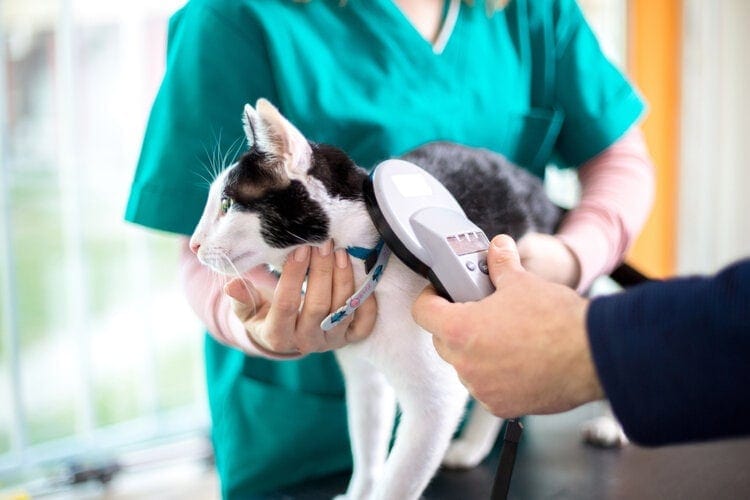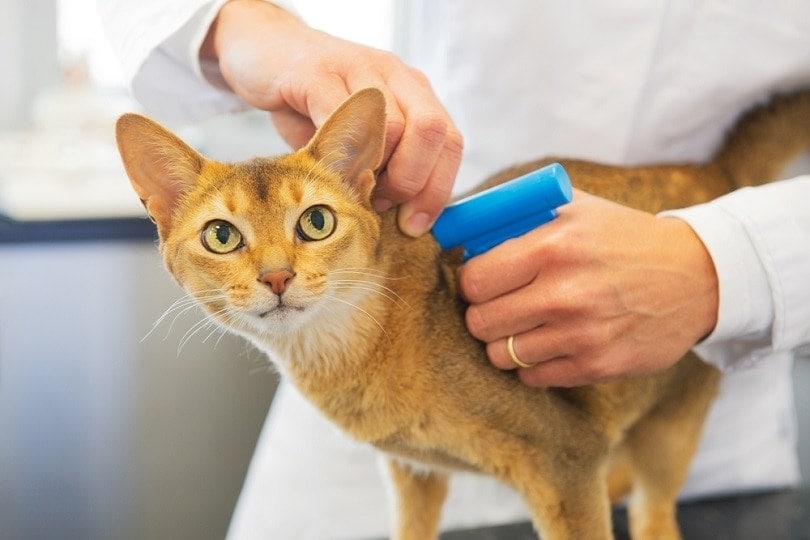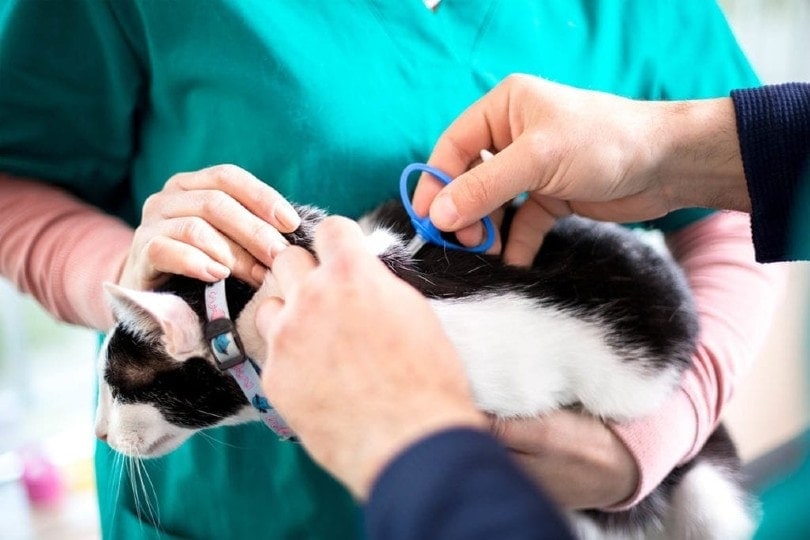
Microchipping is a common practice that’s a relatively low-cost safety measure for pet cats. There are several different ways to get your cat microchipped, but the most common method is to have your veterinarian do it.
Prices vary slightly with microchipping, with the average price of microchipping your cat being $45 if you get it done by a veterinarian. However, you may also find discounted opportunities to get your cat microchipped because many animal welfare organizations support and promote microchipping. After you’ve weighed your options, you should be able to find a way to get your cat microchipped at the most affordable cost.
The Importance of Microchipping Your Cat
Microchipping cats is important because it can help reunite you with your cat if it gets lost. Collars can be removed, but microchips are permanent and increase the chances of finding your cat.
In addition to helping lost pets, many pet adoption centers will microchip stray cats and dogs for preventative purposes. Once a pet gets adopted from a shelter or rescue, the microchip will be updated with your contact information. Then, if the pet gets lost, shelters have a better way to reunite them with its owners. This helps reduce the number of animals that land and stay in shelters for long periods of time.
How Much Does Microchipping Your Cat Cost?
The price of microchipping your cat will vary slightly on several factors. However, the average price of microchipping your cat is $45 if you get it done by a veterinarian. Costs can differ depending on which company your veterinarian gets the microchips. Also, some large veterinarian companies have special wellness packages or discounts for new pet kittens and may include microchipping in these specials.
If you’re adopting a cat from a shelter or rescue, there’s a good chance that the cat already has a microchip. Some breeders will also microchip their litters of kittens before selling them. Lastly, many non-profit and animal rights organizations offer discounted microchipping services in an effort to reduce the number of animals that end up in shelters.

Additional Costs to Anticipate
If you get your kitten microchipped by a veterinarian, an additional cost to anticipate is the veterinarian fee associated with the visit. Most appointments that have microchipping will also include a wellness checkup. So, you may end up paying for other things that come with the checkup, such as vaccines or flea and tick prevention medication.
You won’t have to worry about any aftercare costs with microchipping. Cats don’t have to be sedated for the procedure and can go home with you on the same day. Your cat may feel some discomfort when the microchip is injected into its skin, but the needle is so fine that it rarely causes bleeding. Because the wound is so small, any bleeding usually stops quickly.
Does Pet Insurance Cover Microchipping?
Microchipping isn’t a service that’s typically covered by a basic accident and illness pet insurance plan. If you want pet insurance to cover microchips, you’ll probably have to purchase a wellness plan or add a wellness rider to your pet’s insurance plan.
Since microchipping is a relatively cheap service, most pet insurance companies will help pay for it. So, if you’re interested in enrolling your pet in an insurance plan, make sure to look through the pet insurance company’s coverage for wellness and routine care services and see if microchipping is included in any insurance packages.

How Do Microchips for Cats Work?
It’s important to note that microchips aren’t GPS trackers. Instead, they contain your contact information that’s stored in a database secured by a microchipping company. Animal shelters and veterinarians have scanners that will detect the microchip. The microchip will have an ID number that the company will have on file. The company will be able to contact you when it’s given the ID number.
Since microchips only contain your contact information, it’s important to keep them updated throughout your cat’s lifetime. Always remember to contact your microchip company any time you change your address or phone number.
How to Update Your Information on Your Cat’s Microchip
You’ll have to contact the microchip registry associated with your cat’s microchip. Most microchip registries have websites where you can make personal accounts with each microchip.
So, the three main pieces of information that you’ll need are your account login ID, your password, and the microchip ID. Any time you have to update your contact information, you can log into the registry’s website and make changes from there.
If your cat experiences a transfer of ownership, you’ll have to contact the microchip company to determine how to update the information on the microchip. Most companies require the previous owner to complete a form that verifies that the cat has a new owner.

Conclusion
Microchipping your cat is an affordable way to help keep your cat safe, and it’s a quick procedure that can be completed in minutes. Veterinarians and many organizations can help get your cat microchipped, so it’s pretty easy to book an appointment.
Just remember that once your cat gets microchipped, it’s the owner’s responsibility to ensure that the information on the microchip is updated. So, make sure that you know precisely what your microchip company requires for you to update your contact information.
Featured Image Credit: Lucky Business, Shutterstock






